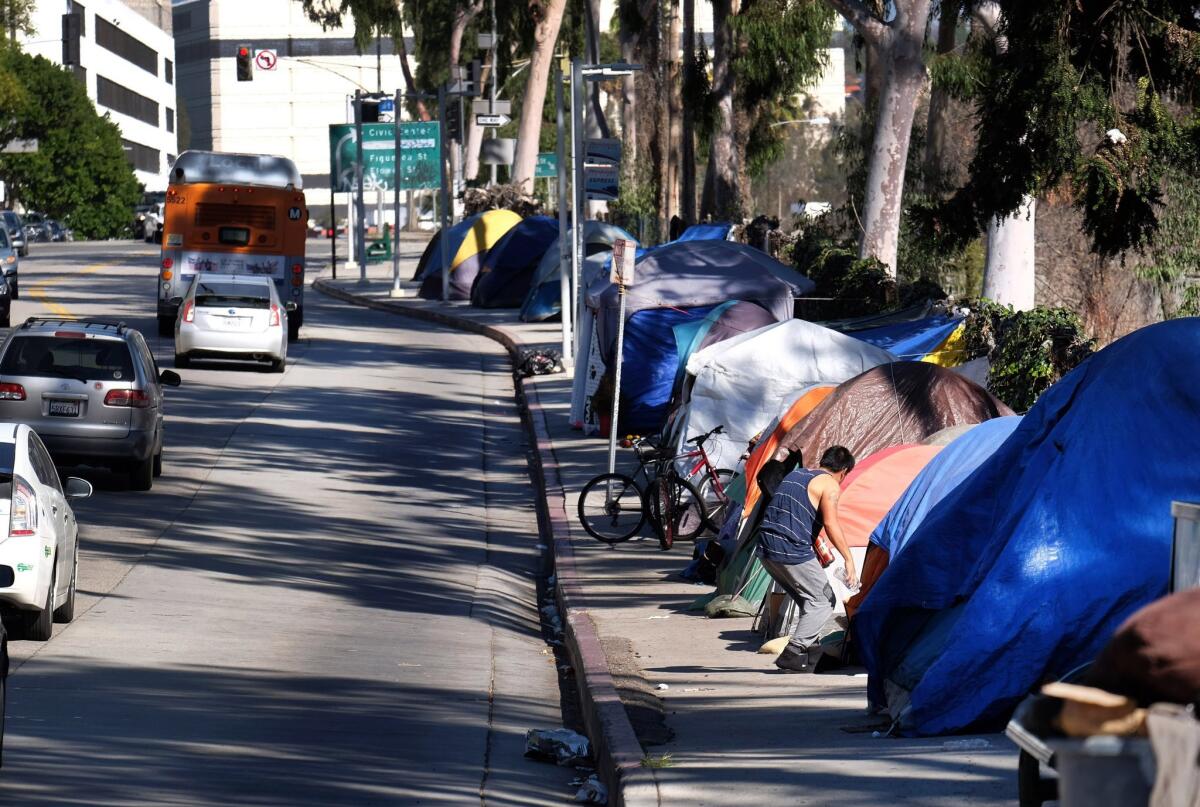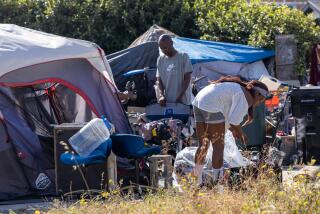Use-of-force incidents against homeless people are up, LAPD reports

More than one out of three times that a Los Angeles police officer used force in recent months involved a person experiencing homelessness, according to a new LAPD report.
During the third quarter of 2019, officers used force on homeless people 217 times, a 26% increase from the same period in 2018 when that number was 172.
LAPD homeless coordinator Cmdr. Donald Graham pointed to the city’s growing homeless population and an uptick in crimes committed by and against homeless people.
“There’s going to be more contact between the police and persons experiencing homelessness,” he said after a discussion of the report at Tuesday’s Police Commission meeting. “The expected result of that will be increases in uses of force.”
The county’s annual “point in time” count of the homeless population began Tuesday. In the last count, the number of people lacking permanent housing climbed 16% from the previous year to more than 36,000. A recent Times analysis found more homeless people than previously reported suffering from addiction, mental illness and physical disabilities.
The report did not include a detailed breakdown of the type of force used by officers, but Graham told commissioners that five of the 217 incidents where force was used in the third quarter of 2019 involved a “categorical use of force” — which includes instances where force resulted in a serious injury.
These five included an officer-involved shooting and one in-custody death, he later said. Other uses of force among the count could involve acts such as a firm hand grip to keep someone from moving.
“The first thing I’d be looking at is the force used,” he said. “If there is a specific increase in, say, baton usage on the homeless population, obviously that would be very concerning.”
Shane Murphy Goldsmith, vice president of the Board of Police Commissioners, said she was “really concerned” about the increases in use of force. Adrienna Wong, a staff attorney with the ACLU of Southern California, called the uptick shocking. It reflects the need, she said, for the department to examine whether officers are applying a different standard to how they use force against the homeless population.
“For some time now we’ve seen the city turning to law enforcement to respond to the homelessness crisis, and this is just another sign that that’s a misguided approach,” she said.
While the report didn’t provide more context on the uses of force, Eric Tars, the legal director at the National Law Center on Homelessness and Poverty, said homeless people more frequently come into contact with police because they live their entire lives in public.
“Many activities that we take for granted — sleeping, eating, sitting down, resting, going to the bathroom — can be deemed criminal acts when performed by homeless people outside,” he said.
Graham said he would continue to raise awareness among officers about using de-escalation strategies when encountering homeless people. He said the department had reached out to the Los Angeles Homeless Services Authority about best approaches. The agency declined to comment on the new report.
Crimes involving homeless people also increased. The third quarter of 2019 saw a 12% increase in violent and property crime involving a homeless suspect. There was a 19% increase in crimes with a homeless victim.
The heightened property crime, Graham said, could reflect more frequent reporting by homeless victims. Violent crime, he said, was occurring in areas with higher concentrations of homeless people.
“There’s a lot of stresses out there on the streets, there’s a lot of angst, there’s a lot of misunderstanding and I don’t know if there’s a lot of communication,” he said. “That can result in violence.”
Misdemeanor arrests remained practically unchanged, but felony arrests increased by 8%. Citations after release from custody for such acts as blocking the sidewalk and drinking in public dropped by 8%.
While acknowledging the compassion that must be shown toward a vulnerable population, LAPD Chief Michel Moore said the department would not step back from responding to crime done by or against homeless people.
“Individuals experiencing homelessness that are preying on other members within that homeless community or that are committing crimes of violence or property crimes in the neighborhood will have the attention of the Los Angeles Police Department,” he said. “Experiencing homeless, while a life challenge, does not” mean a person can break the law.







